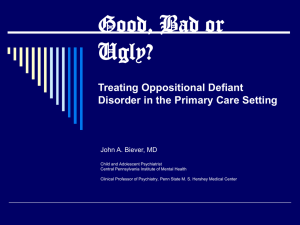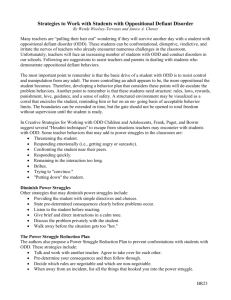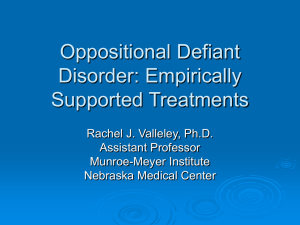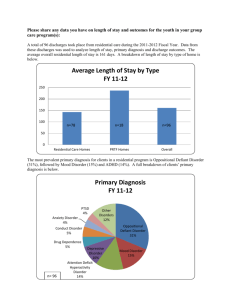A Guide to Oppositional Defiant Disorder
advertisement
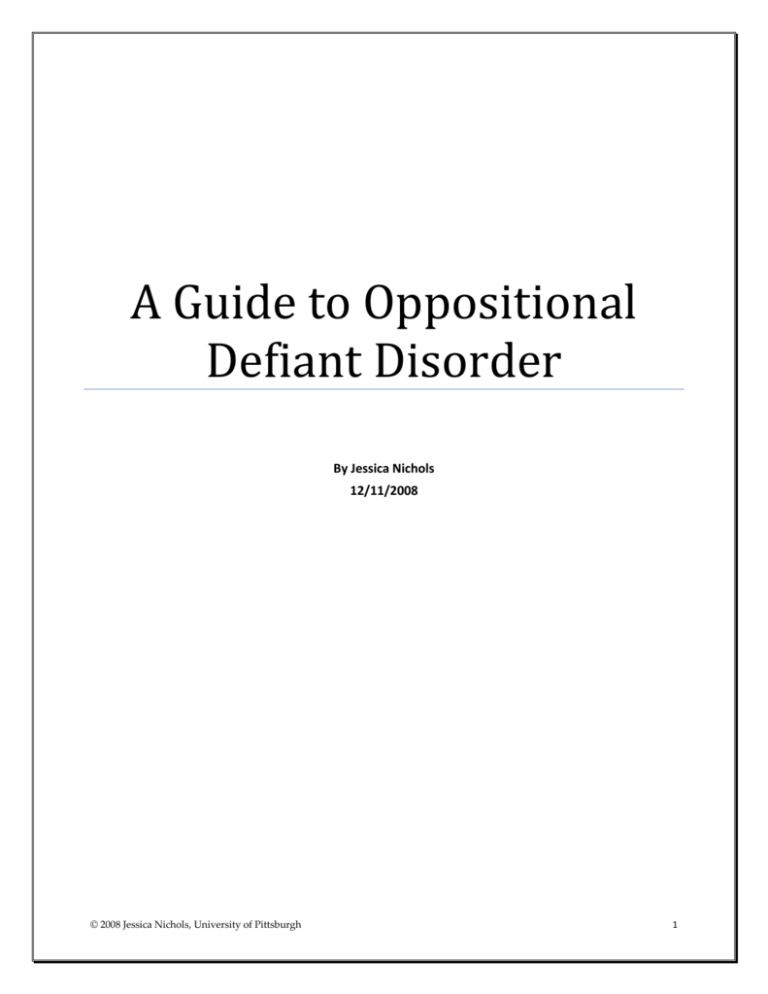
A Guide to Oppositional Defiant Disorder By Jessica Nichols 12/11/2008 © 2008 Jessica Nichols, University of Pittsburgh 1 Oppositional Defiant Disorder Study Guide for Listeners Table of Contents Part I: Introduction………………………………………………………………………………………………page 3 Part II: Glossary……………………………………………………………………………………………………page 4 Part III: Script for Podcast #1: Oppositional Defiant Disorder Newscast………………page 5 Part IV: Script for Podcast #2: My Friend, Sammy………………………………………………..page 11 Part V: How to Help, Educational Implications, and additional resources…………...page 13 Part VI: Reference list………………………………………………………………………………………….page 15 © 2008 Jessica Nichols, University of Pittsburgh 2 Part I: Introduction Welcome to the Listener’s Guide to Oppositional Defiant Disorder! This study guide will help you follow along with the podcasts titled “Oppositional Defiant Disorder Newscast” and “My Friend Sammy”. Both the podcasts and study guides are a project that has been a product of a graduate course through the University of Pittsburgh’s Psychology in Education department. This course, titled “Emotional Disorders in Childhood”, is led by Dr. Mary Margaret Kerr. Podcasts are voice recordings about specific information, such as ODD. Many podcasts are similar to a radio show and usually last only a few minutes. In this guide, you will be supplied with both scripts to the podcasts aforementioned. This should enable you to follow along more closely. Also included in this listener’s guide is a glossary, a section on how to help and educational implications, as well as a complete reference list. The glossary will help you learn any unfamiliar words found within the text of the podcasts. The section on how to help and educational implications will give short recommendations for parents and teachers on how to best deal with children who have ODD. Lastly, the complete reference list will allow you to explore any information found within the text further. I sincerely thank you for reading and listening to this guide. It is my hope that it may expand and increase understanding about a mental health illness that can be happening in © 2008 Jessica Nichols, University of Pittsburgh 3 anyone’s home or school. Please share any information you may feel that is suitable for other audiences and educational purposes. Part II: Glossary These words/abbreviations are bold faced throughout the text. 1. ADHD- (Attention Deficit Hyperactivity Disorder) a disorder that affects a person’s ability to focus and/ or enables them to become easily distracted, as well as being impulsive and hyperactive. 2. Mental Health Disorder- diagnosed disability that occurs in an individual that affects their normal daily functioning. 3. ODD- (Oppositional Defiant Disorder) a mental health disorder whose symptoms manifest as an ongoing pattern of negative behavior and actions towards authority figures. © 2008 Jessica Nichols, University of Pittsburgh 4 Part III: Podcast Script #1 Oppositional Defiant Disorder Newscast Announcer: “Now, broadcasting live from Pittsburgh, Pennsylvania, It’s time for your breaking news from Station UPTT at 5 o’clock. “ *Introduction music* Anchor: “Good evening, and thank you for tuning in.” “Today’s top stories: New politicians take office in City Council, A local man has a change of fortune when he unexpectedly wins the lottery, and first, we’ll start with a special report from Lisa Smith on an important issue many children, families, and schools are dealing with.” Reporter, Lisa Smith: “As Mark mentioned, today we’re talking about Oppositional Defiant Disorder, or more commonly referred to as ODD. This very important topic affects children and their families. Your child or student may have ODD if they often have temper tantrums, show anger and aggression, and argue with adults.1Other ways these children will act are that they do not like to follow directions and sometimes break rules on purpose. They can also be 1 Diagnostic and Statistical Manual of Mental Disorders, fourth edition -text revision, 2000 © 2008 Jessica Nichols, University of Pittsburgh 5 stubborn as they are never willing to give in and give-up on a fight. All of these behaviors make these children hard to deal with. There is not one specific cause for ODD. According to Psychologists, ODD may occur in families with a history of Attention Deficit Hyperactivity Disorder (ADHD.) Information shows that from one-third, up to as many as one-half, of children diagnosed with ADHD also have ODD.2 The Surgeon General explains that family factors such as lack of child supervision, poor quality childcare, and family instability may also contribute to the development of ODD.3 ODD is a mental health condition that is most often detected in infants, children, and adolescents. American Psychologists find, that out of every one hundred kids, two to sixteen of them will have ODD. Furthermore, this problem is seen more with young children who are very active and have temper tantrums.4 Many of you may be asking, “How do I know if my child or student has this disorder?” For most children, ODD is a difficult disorder to diagnose because it is behaviorally based. There is no particular test to determine if a child has the disorder or not. Because of this, mental health specialists base their diagnosis on specific standards. Mainly, ODD is recognized because it causes repeated and large interruptions in the child's life at home and school. It also must be happening for at least 6 months.5 More boys than girls have ODD before puberty but both genders have it equally after puberty. Furthermore, ODD may be a first step to the more severely disobedient conduct disorder, as reported by Surgeon General. National Institute of Mental Health, 1996 Mental Health: A Report of the Surgeon General, 2008 4 Diagnostic and Statistical Manual of Mental Disorders, fourth edition -text revision, 2000 2 3 © 2008 Jessica Nichols, University of Pittsburgh 6 If you are living or working with a child who has this disorder, you already know that children with ODD can be very difficult and challenging. These children do not like to be told what to do. In addition, they are unwilling to cooperate with adults or peers and demonstrate continual stubbornness. In some cases, these children can become forceful and aggressive toward particular adults. When confronted with their actions, children with the disorder often claim they are just being asked to do something unreasonable. In other words, they blame others for their mistakes. One-thing parents and teachers must not do, is blame themselves and think the child ‘just doesn’t like them.’ These symptoms are seen in multiple settings including home and school. When the non-cooperation begins to get in the way of a child’s day-to-day functioning, they may be recommended for diagnosis of the disorder.5 Now that you know what ODD looks like and how to recognize it, let’s explore how we can help children with the disorder. Both medicine and counseling are valid treatments for children with ODD. Sometimes, the most helpful methods are a mixture of the two therapies. However, treatments are most helpful when made to fit the particular child and their family. 6 The first styles of treatment we’ll discuss are counseling methods. American Psychologists suggest that teaching children how to problem solve and then teaching good parenting skills are the most effective together. In parent training programs, parents learn how to deal with their child’s behavior and how to settle disagreements. As always, treatments should be personalized to the child. Factors considered are age, severity, situation, etc. 7 5 6 Diagnostic and Statistical Manual of Mental Disorders, fourth edition-text revision, 2000 The American Academy of Child and Adolescent Psychology, 2008 © 2008 Jessica Nichols, University of Pittsburgh 7 Other family interventions include family therapy sessions. Families with a defiant child usually have more arguments and lack positive communication. To help these issues, the whole family is taught how to deal with the stress of ODD and ways to handle stress and difficulties. 8 Certain medications may also be used to treat symptoms of ODD. What the general population should know is that there is no single medication specifically formulated to treat ODD. However, medication may be used to treat specific symptoms or to treat the coexisting conditions. For example, a medication used to treat symptoms of ADHD may be utilized to treat the child’s co-existing disorder and symptoms of ADHD.7 I hope that this special news segment has given you a better understanding of a mental health disorder that has affected or may affect your lives. People dealing with ODD need to understand that they are not alone. ODD is affecting many lives across the nation. Even so, remember, when treatment plans are tailored to the child and followed closely by all involved, the situation can become easier for everyone. If you are interested in further information, please visit our website for more details about this disorder. You can also find additional links for dealing with the Oppositional Defiant child in your life. Again, thank you for tuning in. This has been Lisa Smith reporting on Oppositional Defiant Disorder. *Closing music* 7 American Academy of Child and Adolescent Psychology, 1999 © 2008 Jessica Nichols, University of Pittsburgh 8 The material in this podcast came for several sources. These resources include: 1. American Academy of Child and Adolescent Psychology, Children with oppositional defiant disorder: Facts for families, and Oppositional defiant resource center. 2. American Psychiatric Association’s Diagnostic and Statistical Manual of Mental Disorders, fourth edition. 3. Child & adolescent psychiatry: A comprehensive textbook. By Melvin Lewis 4. Mental Health: A Report of the Surgeon General, Other mental disorders in children and adolescents 5. National Institute of Mental Health, Attention deficit hyperactivity disorder. © 2008 Jessica Nichols, University of Pittsburgh 9 Resources American Academy of Child and Adolescent Psychology (1999) Children with oppositional defiant disorder: Facts for families. Retrieved September 22, 2008 from http://www.aacap.org/cs/resource_center/odd_faqs. American Academy of Child and Adolescent Psychology (2008). Oppositional defiant resource center. Retrieved September 22, 2008 from http://www.aacap.org/cs/resource_center/odd_faqs. American Psychiatric Association (2000). Diagnostic and Statistical Manual of Mental Disorders, fourth edition (text revision). Washington, DC: Author. Accessed September 23, 2008 via STAT!Ref at http://online5.hsls.pitt.edu:2205/TOC /TOC.aspx?FxId=37&SessionId=D6270DJPJNVIKOSV. Lewis, Melvin (Ed.). (2002). Child & adolescent psychiatry: A comprehensive textbook. Mental Health: A Report of the Surgeon General (2008). Other mental disorders in children and adolescents. Retrieved September 22, 2008 from http://www.surgeongeneral.gov/library/mentalhealth/chapter3/sec6.html. National Institute of Mental Health (1996). Attention deficit hyperactivity disorder. Retrieved September 22, 2008 from http://www.nimh.nih.gov/health/ publications/adhd/nimhadhdpub.pdf. © 2008 Jessica Nichols, University of Pittsburgh 10 Part IV: Podcast Script #2 My Friend, Sammy Spoken by 9-year-old female student: Hi. My name is Abby. I’m a student in a school, probably a lot like the one you go to. I want to talk to you about a problem someone in my grade has. Actually, this someone is my best friend. Her name is Samantha. I call her Sammy. You see, my friend is really nice….once you get to know her. Most of the other kids in my grade don’t want to be friends with Sammy though. It’s probably because Sammy can be really hard to play with. Here are some of the things Sammy does: She doesn’t like to lose at games, so sometimes she’ll break the rules so she can win. If she’s caught cheating, she’ll deny that she did anything wrong and then get really angry. When she’s had a really bad day, Sammy will even talk back to the teacher and argue with her! Mrs. Smith doesn’t like when Sammy has temper tantrums and makes Sammy go to the principal’s office on those days. I wish more people understood what was wrong with Sammy so they didn’t just think she’s ‘a bad kid.’ Because, Sammy really isn’t bad. She can’t help the way she acts because she has a type of mental health illness. The doctor calls this Oppositional Defiant Disorder. I’m going to call it ODD because it’s easier to say. Some of you listening might think ‘Hey, there’s a kid like that in my classroom! They can be really mean and don’t cooperate at all!’ Well I’m here to tell you how you can understand that student more and hopefully, become their friend. © 2008 Jessica Nichols, University of Pittsburgh 11 The first thing you should probably know is that kids with ODD can’t help that they have ODD. It’s not like they chose to be this way. It just happened. The second thing you should always remember is that these kids need a lot of patience. Try not to take the things they do personally. Don’t blame yourself for their behavior. Kids with ODD can get angry at anyone at home or school. In addition, try not to argue with kids who have ODD. Because, let me tell you, if I ever fight with Sammy….she’s gonna win. Even if we both know she’s wrong, she’ll insist that she’s right. These types of children can be stubborn. So it’s best not to get involved in a fight. It’ll just make things worse. The best thing you can do is be calm and relaxed around kids with ODD. Believe me; I know this is hard to do. It can be especially hard when these kids are so uncooperative and seem not to get along with anyone! Let me tell you about the benefits of being friends with someone like Sammy. Sammy is one of the best friends I’ve ever had. She never tells anyone my personal secrets so I can trust her with anything! She never forgets my birthday and knows all of my favorite things. Sammy also has a cool tree house and she always invites me over to play in it. If other people in my grade would take the time to get to know Sammy, they would know how great she can be too. I hope that after hearing this you’ll give those kids in your class another try. Children with ODD don’t want to be lonely, they need friends just like everyone else. I hope that you can become one of the best friends they’ll ever have! If you would like to know more about having people with ODD in your class you can write to me. I’d love to help! © 2008 Jessica Nichols, University of Pittsburgh 12 Part V: How to help, Educational Implications, and Additional Resources What to do: Living or working with someone who has this disorder can be challenging. Here are some suggestions of how to deal: 1. Be patient. This can be very hard to do at times, but it is important to be very patient with people who have ODD. Being worked up only escalates the situation. 2. Avoid power struggles and arguments. Fighting with the child only makes them more angry and frustrated. 3. Diffuse a situation or outburst. Try to be understanding. Use active listening. 4. Emphasize problem-solving skills. Teach the child better ways to deal with their frustration and how to handle their stress. 5. Be a supportive and caring figure for them. These children may have chaos in other elements of their lives. Try to be a dependable consistency. What not to do: 1. Engage in arguments. Fighting back might make the child more defiant. 2. Blame yourself. These symptoms are seen in multiple settings including home and school. Educational Implications As an educator, one will most likely encounter a student with ODD in their classrooms at some point throughout their career. It is important that educators be familiar with the disorder so that they may better understand the needs of this particular population of students. In © 2008 Jessica Nichols, University of Pittsburgh 13 addition, educators may have a hand in identifying the disorder and recommending a student for diagnosis and evaluation. When teaching a student who is defiant, a teacher might employ a variety of strategies including, defensive management by Fields (2003), high-probability request sequences (Hildebrand, Hua, & Lee, 2007), and/or effective commands by Matheson & Shriver (2005). Additional Online Resources for Educators 1. http://www.disciplinehelp.com/teacher/ Describes specific actions to take with “the defier” in your classroom. 2. http://education.osu.edu/gcartledge/urbaninitiative/compliance.htm This is a multi-faceted website with several useful aspects relating to the subject of student noncompliance. Sections of this source include: “getting your message across,” ”stop power struggles,” “conflict resolution,” “managing explosive situations,” and “games/strategies for dealing with noncompliance.” Each section provides explanation in detail for the specific theory cited. In addition, it provides additional sources and tips for teachers and parents with defiant students. © 2008 Jessica Nichols, University of Pittsburgh 14 Part VI: Resources Resources American Academy of Child and Adolescent Psychology (1999) Children with oppositional defiant disorder: Facts for families. Retrieved September 22,2008 from http://www.aacap.org/cs/resource_center/odd_faqs. American Academy of Child and Adolescent Psychology (2008). Oppositional defiant resource center. Retrieved September 22, 2008 from http://www.aacap.org/cs/resource_center/odd_faqs. American Psychiatric Association (2000). Diagnostic and Statistical Manual of Mental Disorders, fourth edition (text revision). Washington, DC: Author. Accessed September 23, 2008 via STAT!Ref at http://online5.hsls.pitt.edu:2205/TOC/ TOC.aspx?FxId=37&SessionId=D6270DJPJNVIKOSV. Fields, B. (2004). Breaking the cycle of office referrals and suspensions: Defensive management. Educational Psychology in Practice, 20, 103-116. Hildebrand, K.E., Hua, Y., Lee D.L. (2007). Dealing with noncompliance in the classroom. Retrieved September 23, 2008 from http://www.cec.sped.org. Lewis, Melvin (Ed.). (2002). Child & adolescent psychiatry: A comprehensive textbook. Matheson, A.D., Shriver, M.D. (2005). Training teachers to give effective commands: Effects on student compliance and academic behaviors. School Psychology Review, 34, 202-219. Mental Health: A Report of the Surgeon General (2008). Other mental disorders in children and adolescents. Retrieved September 22, 2008 from http://www.surgeongeneral.gov/library/mentalhealth/chapter3/sec6.html. National Institute of Mental Health (1996). Attention deficit hyperactivity disorder. Retrieved September 22, 2008 from http://www.nimh.nih.gov/health/publications/adhd/nimhadhdpub.pdf . © 2008 Jessica Nichols, University of Pittsburgh 15
